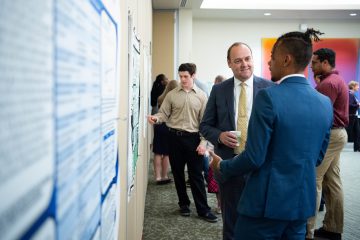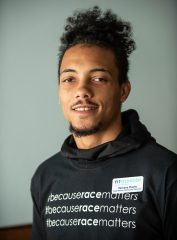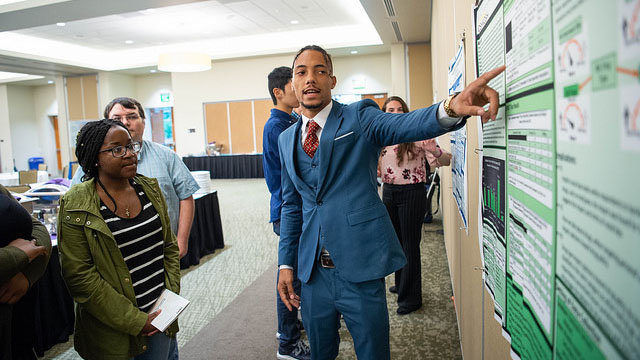A University of Wisconsin Oshkosh student graduating this month with a human services leadership degree, says he dreams of breaking the cycle of poverty that restricts so many.
A McNair Scholar at UW Oshkosh, Terrace Davis hopes to pursue a master’s degree in social work at the University of Michigan at Ann Arbor.
Davis grew up in a violent, drug-infested, impoverished community in Champaign, Illinois—he lost friends to gun violence and recently a cousin sustained near-fatal gunshot wounds. The violence and poverty in his community motivated him to seek an education that could help youth living in similar circumstances.
“I realized I would not be able to help them effectively and efficiently without knowing why it was they needed the help in the first place, so I minored in sociology,” Davis said.
Beating the odds
“Mr. Davis was not the kind of student who was supposed to succeed in college much less go on to graduate school,” said Cordelia Bowlus, McNair program director at UW Oshkosh.
Davis, is part of this year’s class of McNair Scholars, many of whom are first-generation college students from challenging socioeconomic backgrounds. He said he initially didn’t think he would be able to do the work required, was nervous and “thought they had the wrong guy.”
The program challenged him and opened doors that he never thought possible.
Bowlus wrote a letter of recommendation for Davis for graduate school, outlining her impression of his “incredible potential as a leader in the field of social work.” She said he has maximized his undergraduate education to gain a clearer understanding of the psychological, political and socio-economic forces that perpetuate the cycle of poverty.
“From the first time I met Mr. Davis, I was struck by his humble, deeply reflective demeanor in the face of tremendous personal loss and struggles. He was clearly consumed with a desire to use personal experience and education to transform the lives of others.”
She said through “sheer grit” he converted frustration into accomplishment as a student. Davis conducted research on a self-selected topic: Implicit Racial Bias in Public Opinion towards Drug Policy

His faculty mentor, James Krueger of the political science department said Davis was inspired by Michelle Alexander’s book The New Jim Crow. Krueger called Davis “an incredibly motivated” individual.
Much of his research has been centered on poverty, inconsistency in drug laws and racial inequalities—areas that continue to impact his life and that of other people of color.
“Although research has proven that people of all colors use and sell drugs at similar rates, studies have shown that people of color are more likely to be arrested and convicted for drug crimes, less likely to receive a plea bargain, more likely to receive lengthy prison sentences and, most importantly, that there is an association between the words black and guilty,” Davis said of his research.
Davis said he dreams of a place where it is safe to ride a bike, own nice things, play at the community park, maintain health and visit family and friends in his hometown. He dreams of flower gardens and large trees and beautifully kept homes. He is intent on eventually opening a business to help at-risk youth. In the near future, he plans to open a not-for-profit organization that pairs high school and middle school students and will train them in landscaping and basic house repair skills. In the summer, youth would be paid for their services through grants, donations and contracts.
“The goal of this program is to break the cycle of poverty,” he said. “This has been a dream of mine, now it’s time for it to come to fruition.”
Leading by example
Tony Laing, lecturer and director of the UW Oshkosh Men of Color Initiative, oversees Davis as a student worker 10 hours a week.
I was impressed (in an interview) that he knew about the mission of the MOCI and articulated a desire to work with me in the planning, marketing and growth of MOCI across the UW Oshkosh community,” Laing recalled.

Tracey Robertson, cofounder and executive director of Fit Oshkosh, hired Davis as an intern. A big part of his role has been directing training for volunteers and ensuring evaluations are distributed and data from them is captured.
He also has developed short videos on various topics, developing content, recording his voice and others and is learning the video editing process.
Fit Oshkosh is dedicated to creating a community that everyone—no matter their race—will fit in.
“As a small organization largely volunteer-led, the role he (Davis) plays is critical,” Robertson said, adding that a member of the board of directors contacted her to tell her how impressed he was with the training.
Recently, Davis was given an opportunity to present his research on race and drug policy to the larger community. Robertson said the Fit Oshkosh offices were “packed” with citizens, coworkers, law enforcement and faith leaders and who turned out to listen. Following the presentation, a member of the audience decided to make a financial contribution to the Fit Oshkosh organization.
Robertson said the impact Davis has had with her organization will be felt well into the future.
Learn more:
- Dec. 15 midyear commencement celebrates new grads, honors past
- Study human services at UW Oshkosh
- McNair Scholars at UW Oshkosh

